Baker Academic Early Church Upgrade II (6 vols.)
Digital Logos Edition
Overview
Continue your journey through the early decades of the Christian church with the Baker Academic Early Church Upgrade II collection. Alistair Steward analyzes the structure of ancient Christianity in the first few centuries in order to understand the role of the bishop in the early church. Brian Litfin provides texts and commentary on early Christian martyr stories that reveal the struggle of the first Christians against the Roman Empire. With works on early Trinitarian theology, the role of worship, and an autobiography of Basil of Caesarea, these works provide valuable insight into the history of the early church.
With Logos, these resources are made to work for you. Scripture references are tagged, allowing you to view your favorite Bible translations while reading along. Important theological concepts link to dictionaries, encyclopedias, and a wealth of other information. Do better Bible study with Logos.

- Provides studies on the history and theology of the early church
- Includes various perspectives on multiple subjects concerning the patristic era
- Resources link to other resources in your Logos library
- Title: Baker Academic Early Church Collection Upgrade II
- Publisher: Baker Academic
- Volumes: 6
- Pages: 1,936
- Resource Type: Monographs; Collected Essays
- Topic: Early Church
- Basil of Caesarea by Stephen M. Hildebrand
- The Original Bishops: Office and Order in the First Christian Communities by Alistair C. Steward
- Early Christianity in Contexts: An Exploration across Cultures and Continents edited by William Tabbernee
- Early Christian Martyr Stories: An Evangelical Introduction with New Translations by Bryan M. Litfin
- The Holy Trinity in the Life of the Church edited by Khaled Anatolios
- Ancient Christian Worship: Early Church Practices in Social, Historical, and Theological Perspective by Andrew B. McGowan
This title is included in the following collections
You can save when you purchase this product as part of a collection.
Baker Academic Early Church Co...
$584.99$584.99Baker Ultimate Collection 2022...
$38,273.89$30,599.99
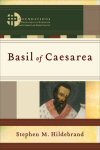
Basil of Caesarea
- Author: Stephen M. Hildebrand
- Series: Foundations of Theological Exegesis and Christian Spirituality
- Publisher: Baker Academic
- Publication Date: 2014
- Pages: 224
This introduction to the thought of Basil of Caesarea surveys his theological, spiritual, and monastic writings, showing the importance of his work for contemporary theology and spirituality. It brings together various aspects of Basil's thought into a single whole and explores his uniqueness and creativity as a theologian. The volume engages specialized scholarship on Basil but makes his thought accessible to a wider audience. It is the third volume in the Foundations of Theological Exegesis and Christian Spirituality series, which critically recovers patristic exegesis and interpretation for contemporary theology and spirituality.
Basil's reputation as a theologian has grown remarkably--and deservedly--in the past few years. New scholarship and new translation has reminded us that Basil is one of the great theologians and Christian teachers of the fourth century. Stephen Hildebrand's book is a very welcome introduction to the 'new Basil.' Hildebrand now takes his place alongside such significant Basilian scholars as Andrew Radde-Gallwitz and Mark DelCogliano.
—Lewis Ayres, Professor of Catholic and Historical Theology, Durham University
Basil of Caesarea is the giant of the fourth-century theologians, and he intimidates many who approach his works today. Here lies the value of Stephen Hildebrand's book: he introduces us not to a part of Basil's thought but to his theology as a whole. Moreover, he introduces not merely a corpus of ancient texts but also their author. This is a valuable book not only for historians of theology but for anyone who wants to understand the role of theology in late antiquity.
—Thomas O'Loughlin, professor of historical theology, University of Nottingham
Basil is a pivotal figure in the history of the church, and his biblical interpretation is no small part of this achievement. We cannot begin to understand his prodigies of charitable activity or ecclesiastical administration until we understand his ascesis and his contemplative approach to Scripture. This book is more than a look back. At a time when the world is regaining an appreciation of social doctrine, spiritual discipline, and patristic exegesis, it is a way forward
—Scott Hahn, Pope Benedict XVI Chair of Biblical Theology and Liturgical Proclamation, St. Vincent Seminary; professor of scripture and theology, Franciscan University of Steubenville
Stephen M. Hildebrand is professor of theology and director of the theology graduate program at Franciscan University of Steubenville in Steubenville, Ohio. He is the author of The Trinitarian Theology of Basil of Caesarea and has published a translation of On the Holy Spirit.
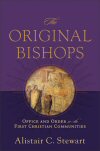
The Original Bishops: Office and Order in the First Christian Communities
- Author: Alistair C. Steward
- Publisher: Baker Academic
- Publication Date: 2014
- Pages: 416
This work provides a new starting point for studying the origins of church offices. Alistair Stewart, a leading authority on early Christianity and a meticulous scholar, provides essential groundwork for historical and theological discussions. Stewart refutes a long-held consensus that church offices emerged from collective leadership at the end of the first century. He argues that governance by elders was unknown in the early centuries and that bishops emerged at the beginning of the church; however, they were nothing like bishops of a later period. The church offices as presently known emerged in the late second century. Stewart debunks widespread assumptions and misunderstandings, offers carefully nuanced readings of the ancient evidence, and fully interacts with pertinent secondary scholarship.
Building on a number of new trends in scholarship and grounded in impressive mastery of the sources, this study drives a coach and horses through the long-standing consensus that presbyters and bishops were once the same and early church governance was collegial. Its challenge to anachronistic reading of the sources should finally undermine contemporary claims to historical precedent in debates about ministry, whether those claims be denominational, ecumenical, or feminist, highlighting as it does the 'otherness' of the socio-cultural order within which the emerging church developed an organization suited to its own needs yet indebted in terminology and practice to its historical context. The Original Bishops is a tour de force, creating a coherent yet complex narrative that, despite its frequent acknowledgment of ignorance given the scrappy nature of the evidence, is sure to be contested. Future discussion of the issues, however, will be unable to ignore this book.
—Frances Young, emeritus professor, University of Birmingham
Stewart shines fresh light on a pivotal theme in late Christian antiquity—the emergence of ecclesiastical offices under the rubrics of presbyter and bishop. He explains with vigor the rise of each category within the framework of individual churches throughout the Roman Empire, from the advent of the Apostle Paul to the turn of the third century, challenging age-old views offered by Lightfoot and others of his generation. Stewart's understanding of the regional presbytery as a collective association of local bishops delivers novel insight into the divergent use of such terminology throughout apostolic and post-apostolic literature. This book is carefully written and demands vigilant reading. Its clear and resourceful analysis of the maze of data from ancient authors—ever a focus of intrigue among contemporary scholars—will engage readers at every level, from the introductory student to the polished specialist!
—Clayton N. Jefford, professor, Saint Meinrad Seminary and School of Theology
This book is a masterwork. With massive erudition, Alistair Stewart elaborates here a bracing hypothesis revising several standard views about the origin of bishops, presbyters, and deacons in the first Christian centuries. Future histories of early Christian ministry will have to take into account the impressively wide scope of Stewart's evidence as well as the arguments he builds on that evidence. The book is valuable for the vast amount of modern scholarship that it gathers on this question as well as for the fresh proposals it brings to the interpretation of numerous ancient Christian sources.
—Joseph G. Mueller, SJ, associate professor and director of graduate studies, Marquette University
Alistair C. Stewart is team vicar of Upton-cum-Chalvey, Slough, England, and visiting scholar of Sarum College in Salisbury, England. Recognized as a leading expert on early Christian liturgy and polity, he is the author or editor of a dozen books.
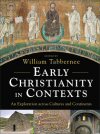
Early Christianity in Contexts: An Exploration across Cultures and Continents
- Editor: William Tabbernee
- Publisher: Baker Academic
- Publication Date: 2014
- Pages: 512
This major work draws on current archaeological and textual research to trace the spread of Christianity in the first millennium. William Tabbernee, an internationally renowned scholar of the history of Christianity, has assembled a team of expert historians to survey the diverse forms of early Christianity as it spread across centuries, cultures, and continents.
Organized according to geographical areas of late antiquity, this book examines what various regions looked like before and after the introduction of Christianity. How and when was Christianity (or a new form or expression of it) introduced into the region? How were Christian life and thought shaped by the particularities of the local setting? And how did Christianity in turn influence or reshape the local culture? The book's careful attention to local realities adds depth and concreteness to students' understanding of early Christianity, while its broad sweep introduces them to first-millennium precursors of today's variegated, globalized religion.
The global presence of Christian faith is now accepted as commonplace. This carefully researched volume demonstrates convincingly how very early that presence came to an extraordinary range of world locations. Close attention to material and cultural evidence makes this an unusually illuminating book.
—Mark A. Noll, author, Turning Points: Decisive Moments in the History of Christianity
Foregrounding the material record of Christianity in the first centuries of the Common Era, Early Christianity in Contexts magnificently captures the diversity of Christian experience within and beyond the borders of the Roman world. First-rate research infuses this welcome volume from start to finish, rewarding those who immerse themselves in its captivating treasures.
—Bruce Longenecker, professor, W.W. Melton Chair of Religion, Baylor University
This is—as always with Tabbernee's books—a carefully written, precise, and well-documented book, but also a book that is a pleasure to read. The chapters contain trustworthy overviews, including the most interesting sources and secondary literature. Those references will allow readers to seek further information. As far as I can see the newest findings and excavations are integrated into the manuscript, and the fact that 'Christianity outside the boundaries' (of the Roman Empire) is included makes the book so valuable. There is no other comparable volume where the new findings from China are integrated in the traditional picture. In short: solid information on archaeological matters is combined with state-of-the-art passages on the history of Christian theologies and denominations.
—Christoph Markschies,professor, Humboldt-Universität zu Berlin
William Tabbernee, ordained in the Christian Church (Disciples of Christ), is executive director of the Oklahoma Conference of Churches. He formerly served as president and Stephen J. England Distinguished Professor of the History of Christianity at Phillips Theological Seminary. Tabbernee led an international team of archaeologists and historians that discovered the long-lost site of Pepouza, Montanism's most holy city. He is the author of numerous books, including Prophets and Gravestones, and lives in Edmond, Oklahoma.
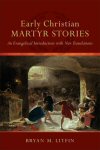
Early Christian Martyr Stories: An Evangelical Introduction with New Translations
- Author: Bryan M. Litfin
- Publisher: Baker Academic
- Publication Date: 2014
- Pages: 192
Personal narratives are powerful instruments for teaching, both for conveying information and for forming character. The martyrdom accounts preserved in the literature of early Christianity are especially intense and dramatic. However, these narratives are not readily available and are often written in intimidating prose, making them largely inaccessible for the average reader. This introductory text brings together key early Christian martyrdom stories in a single volume, offering new, easy-to-read translations and expert commentary. An introduction and explanatory notes accompany each translation. The book not only provides a vivid window into the world of early Christianity but also offers spiritual encouragement and inspiration for Christian life today.
Reflections on Christian martyrdom often either exaggerate or debunk. Bryan Litfin's book on early Christian martyrs is different. It will satisfy not only academics looking for careful documentation but also readers in general, who should appreciate it for encouraging edification as well as solid scholarship.
—Mark A. Noll, author, Turning Points: Decisive Moments in the History of Christianity
This anthology of the most reliable early Christian martyr stories ought to be required reading for all disciples of Christ. It puts today's Christian 'witnesses' in touch with our ancient spiritual role models, inspiring us to greater acts of faithfulness and courage. Litfin's historical introductions offer just what we need to understand and apply these stories in the twenty first century—when many more disciples of Christ are suffering persecution than ever before in the history of the world.
—Douglas A. Sweeney, professor, Trinity Evangelical Divinity School
Professor Litfin, author of an authoritative introduction to the theology of the early Christians, now provides us with a guide to some of their lives—and deaths. Their witness was inspired by their faith in Christ's glorious resurrection and their hope for the coming fullness of his kingdom. Do we too have this freedom, this faith, hope, and love? Inspired by this marvelous book about the friends of Jesus, let us commit ourselves anew to dying with Jesus, so as to live. Only in him will we find the unity and communion that we seek.
—Matthew Levering, Perry Family Foundation Professor of Theology, Mundelein Seminary
Bryan M. Litfin is professor of theology at Moody Bible Institute in Chicago, Illinois. He is the author of several books, including Getting to Know the Church Fathers, and numerous scholarly articles and essays.
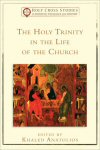
The Holy Trinity in the Life of the Church
- Editor: Khaled Anatolios
- Series: Holy Cross Studies in Patristic Theology and History
- Publisher: Baker Academic
- Publication Date: 2014
- Pages: 272
In this volume, a noted theologian brings together an ecumenical roster of leading scholars to explore Trinitarian faith as it is concretely experienced in the life of the church. Drawing upon and fostering renewed interest in Trinitarian theology, the contributors—including Brian E. Daley, John Behr, and Kathleen McVey—clarify the centrality of Trinitarian doctrine in salvation, worship, and life. This is the third volume in Holy Cross Studies in Patristic Theology and History, a partnership between Baker Academic and the Pappas Patristic Institute of Holy Cross Greek Orthodox School of Theology. The series is a deliberate outreach by the Orthodox community to Protestant and Catholic seminarians, pastors, and theologians.
This book brings together an all-star cast of theologians to explain the role of the Holy Trinity in the life of the church. It also represents the very best of Eastern Orthodox ecumenism. No one interested in the doctrine of the Trinity can afford to overlook this work.
—George Hunsinger, professor, Princeton Theological Seminary
In the last thirty years, scholars have revolutionized our understanding of how, over the course of its earliest centuries, the Christian church came to speak of God as Trinity. This wide-ranging collection of essays both catches readers up on the fruits of that research and pushes it forward. Khaled Anatolios has gathered an excellent array of scholars to explore various contours of this most profound mystery of the Christian faith. And they start where they should, with Christian liturgy, for it is out of the experience of worship—of baptism, of meditation on the Scriptures, of Eucharist—that the trinitarian faith of Christians is rooted, is experienced, is savored.
—William Harmless, SJ, Creighton University
In this rich collection of essays, a holy impatience enlists meticulous historical scholarship to articulate the trinitarian dynamics at work, whether recognized or not, in the faith lives of Christian communities. Convinced that ressourcement opens the path to a revitalized trinitarian theology, the authors trace the connections between liturgy, Scripture, theology, and spirituality in patristic literature, offering fresh readings of major figures, in the face of which conventional truisms fall away. Representing Orthodox, Roman Catholic, and Protestant traditions, they are no mere antiquarians but write with an eye to the relevance of their research for contemporary theology, ecumenism, and issues of gendered speech about God.
—William P. Loewe, professor, Catholic University of America
Khaled Anatolios is professor of historical theology in the Boston College School of Theology and Ministry in Chestnut Hill, Massachusetts. He is the author of Retrieving Nicaea: The Development and Meaning of Trinitarian Doctrine, Athanasius: The Coherence of His Thought, and the Athanasius volume in Routledge's Early Church Fathers series. Anatolios was named a Henry Luce III Fellow in Theology for 2011–2012. He is also on the steering committee of the Boston Colloquy in Historical Theology and on the board of directors of the Pappas Patristic Institute at Holy Cross Greek Orthodox School of Theology.
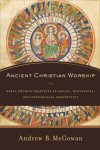
Ancient Christian Worship: Early Church Practices in Social, Historical, and Theological Perspective
- Author: Andrew B. McGowan
- Publisher: Baker Academic
- Publication Date: 2014
- Pages: 320
This introduction to the origins of Christian worship illuminates the importance of ancient Christian worship practices for contemporary Christianity. Andrew McGowan, a leading scholar of early Christian liturgy, takes a fresh approach to understanding how Christians came to worship in the distinctive forms still familiar today. Deftly and expertly processing the bewildering complexity of the ancient sources into lucid, fluent exposition, he sets aside common misperceptions to explore the roots of Christian ritual practices—including the Eucharist, baptism, communal prayer, preaching, Scripture reading, and music—in their earliest recoverable settings. Students of Christian worship and theology as well as pastors and church leaders will value this work.
This is the book that I wish I had written, but Andrew McGowan has done it so much better. Easily accessible to a nonspecialist reader, it nevertheless contains the fruit of the most up-to-date academic scholarship. Anyone wanting a reliable and comprehensive introduction to the practices of the early Christians must start here.
—Paul Bradshaw, emeritus professor of liturgy, University of Notre Dame
Ancient Christian Worship is the book that scholars, teachers, and students of early Christianity and liturgical history have long needed. Andrew McGowan provides an authoritative, accessible, and up-to-date synthesis of what we know (and do not know) about the worship lives of the ancient Christians. Anyone interested in the early church or Christian liturgy will learn from this gracefully written and clearly argued book.
—David Brakke, Joe R. Engle Chair in the History of Christianity and professor of history, Ohio State University
Andrew McGowan here provides a clear and beautifully written introduction to ancient Christian worship. While never oversimplifying the richness and complexity of his subject, McGowan has produced a study that is simultaneously comprehensive and accessible. All readers, from beginners to those more advanced, will be rewarded by both his erudition and his insight. This work justifiably will be cherished by students and teachers alike for generations to come.
—Robin Jensen, Luce Chancellor's Professor of the History of Christian Art and Worship, Vanderbilt University; author of Baptismal Imagery in Early Christianity
Andrew B. McGowan, an Anglican priest, is president and dean of the Berkeley Divinity School and the J. L. Caldwell McFaddin and Rosine B. McFaddin Professor of Anglican Studies and Pastoral Theology at Yale Divinity School. He previously served as warden of Trinity College, University of Melbourne, and is the author of Ascetic Eucharists: Food and Drink in Early Christian Ritual Meals.